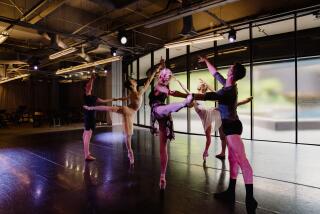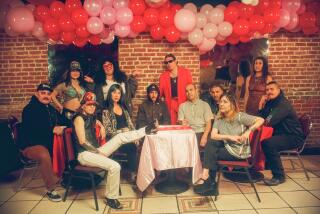These vets are moved to action
- Share via
In a UCLA dance studio, four former U.S. soldiers leap across the floor like children at play, some striking mock ballerina poses. In falsetto voices, they take turns riffing on words meant to evoke what it feels like to return from combat and confront the often absurd disparities between military and civilian life: “Disneyland! Candyland! Butterflies! Daffodils! Valium!”
Meanwhile, choreographer and UCLA professor Victoria Marks watches them intently. “Someone really needs to say, ‘Fluffy bunnies,’ ” she suggests. “Come on, guys. Conjure up the super-sweet here.”
Each member of this quartet suffers from post-traumatic stress disorder and is enrolled in a related treatment program at the West Los Angeles Veterans Administration. But together with Marks and two nonveteran performers, they have also spent the last four months meeting regularly in the studio and experimenting with movement and language that transcend conventional ideas about dance, theater and therapy. The resulting National Endowment for the Arts-funded performance piece, called “Action Conversations,” will be staged Friday and Saturday at Highways Performance Space in Santa Monica.
For Marks, the project represents the fruition of “wanting to learn about the way the vets were seeing their experience, so I could formulate something that would interest them.”
“I had wanted to work with vets for years,” she explains. “But I didn’t know how to approach them. Like if I just said, ‘Hi, I want to make a dance about you,’ they’d probably think I’m out of my mind.”
Political movements
As a choreographer, Marks, 52, has never been afraid to tackle difficult, weighty issues in ways both satiric and poignant. But since 9/11, she has created a body of work that might be described as one continuous dance about war and its effect on identity and responsibility, both personal and collective. Her “Not About Iraq,” which premiered in L.A. in October, posed provocative questions about the role of the artist in civic life and what, if any, moral imperatives exist when it comes to making art in troubled times.
Giving birth to twins in 2000, Marks says, led her to a “shift in perspective, where I asked myself what responsibility do I have for bringing my kids into this world, which I think is a very scary place right now. Sure, I have my nice life here, but I know this is not the rest of the world.”
Much like her choreography, Marks manages to articulate political opinions without coming across as overly earnest, heavy-handed or didactic. Sitting in her office at UCLA, she’s often funny and self-effacing as she describes the many false starts that littered the path to “Action Conversations.”
Defining ‘disability’
Initially, she thought she wanted to work with physically disabled vets. “For me, ‘Not About Iraq’ had a lot to do with the way the media presents images of the heroic, so it got me thinking about the guy who comes back from Iraq as a double amputee,” she says.
But then she began talking to veterans with PTSD. “I realized that disability is not necessarily visible, especially when you consider that traumatic brain injury is the signature wound of Iraq. I think that ‘disability’ is going to be redefined because of this war.”
Marks decided to offer a workshop that would allow for “a series of conversations between vets and artists. I didn’t think there was going to be a performance.” However, the workshop -- which offered free pizza and focused on exercises in trust-building and improvisation -- attracted a core group of regulars who wanted to perform.
“So now it’s a performance, and we’re rehearsing structured improvisations, but at the same time, whatever is going to happen is going to happen,” she says, a hint of director’s anxiety creeping into her voice. “I’m normally a careful choreographer who sets everything. You can’t do that with improvisation.”
New expressions
Manuel Flores, a 36-year-old former Marine who served during Operation Desert Storm, views the upcoming performances “as something good coming from something horrible. This is allowing me an opportunity to deal with my experiences in a positive way,” he says.
Flores, who’s also a poet and an actor, adds that in Marks’ rehearsals, he’s not acting. “I’m just being me,” he says. “And my family and others will see me onstage in a way they normally can’t.”
For 29-year-old Aaron McCollum, a recent Coast Guard veteran who sports tattoos, piercings and distinctive red sideburns, working in the studio “always makes me feel better, no matter how bad a day I had. You get tired of seeing psychologist after psychologist who say they understand what you’re feeling when they don’t. But I come here and it’s always therapeutic.”
Basic training
Although McCollum and the other veterans exhibit natural ability in the studio, they lack formal training, which might sound daunting or even undesirable for some choreographers. Marks, though, “is not religious about dance being one particular way or another. Sometimes, I think the only way I can love dance is by shaking it up a bit.”
She says that more important, perhaps, than the movements, monologues or dialogues that have emerged in the rehearsal process is “the shared compassion between us that wouldn’t occur anywhere else. It’s why people go to the theater, I think, to contemplate things they normally can’t in their regular lives. I also think theater is fascinating when you know something about the people who are doing it.”
Flores, for example, has observations in the piece such as “I guess they can’t teach you what it’s like when you kill somebody.” At one rehearsal, he whispers his lines to Marks, who then repeats them in an exchange she calls “a private transaction made public.”
By such devices, Marks believes, the veterans “can create antidotes in their memories for what happened.”
“I wanted the vets to explore what makes them want or not want to tell their stories onstage,” she says. “And if they can’t tell their stories, then I can try and do it for them.”
--
‘Action Conversations’
Where: Highways Performance Space, 1651 18th St., Santa Monica
When: 8:30 p.m. Friday; 5 and 8:30 p.m. Saturday
Price: $10 to $20
Contact: (310) 315-1459 or www.highwaysperformance.org
More to Read
The biggest entertainment stories
Get our big stories about Hollywood, film, television, music, arts, culture and more right in your inbox as soon as they publish.
You may occasionally receive promotional content from the Los Angeles Times.










